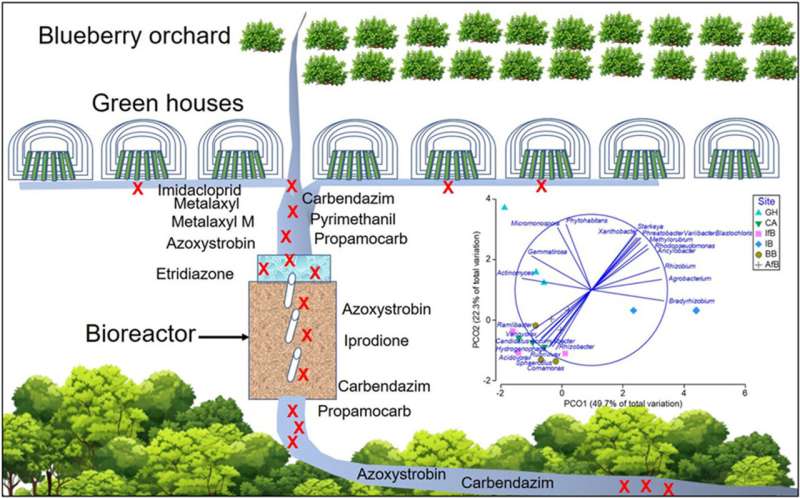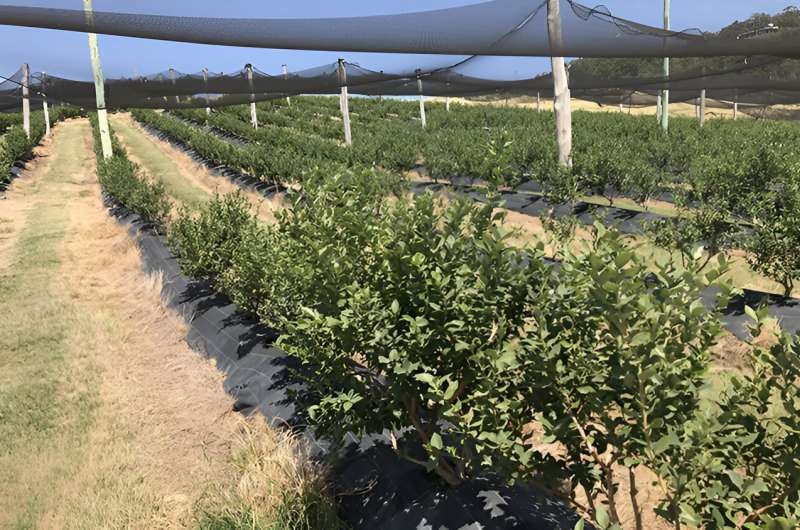This article has been reviewed according to Science X's editorial process and policies. Editors have highlighted the following attributes while ensuring the content's credibility:
fact-checked
peer-reviewed publication
trusted source
proofread
Woodchip bioreactor helps reduce pesticide run-off from horticulture greenhouses

Pesticides seeping out of intensive horticulture into waterways have long-concerned NSW north coast communities. Now a new Southern Cross University study provides evidence that bioreactors can significantly limit this toxic run-off.
The study is the first evidence that microbial communities in woodchip bioreactors can effectively reduce the type of pesticides being used in intensive horticulture in NSW. However, some highly water-soluble pesticides may still get through.
In new research published in the journal Environmental Pollution, Southern Cross University researchers tested a woodchip bioreactor originally constructed to mitigate nutrient run-off from fertilizer into the Solitary Islands Marine Park off the Coffs Coast.
Lead researcher Professor Kirsten Benkendorff and her team from the University's National Marine Science Center found this same woodchip bioreactor has been successful in reducing the number and amount of pesticides escaping into the environment.
Two insecticides and nine fungicides were present in soil samples below the greenhouses. Yet the concentration of at least six of these pesticides decreased along a gradient into, through and below the bioreactor.
Microorganisms found in soil can help breakdown some types of pesticides.
"When these toxic chemicals enter our waterways, they can cause harm to non-target organisms, including seafood like prawns, crabs and oysters. Exposure to pesticide residues also has potential implications for human health," said Professor Benkendorff.
"However, we found a reduction in the types of soil microorganisms immediately below the greenhouses, where pesticide concentrations were high. This suggests that pesticides could be impacting the soil productivity."
A bioreactor is a vessel for biological reactions to take place. It creates a suitable environment for the types of microbes that are capable of degrading pesticides.
"The bioreactor was dominated by microbes that are known to be resistant to pesticides and have been previously associated with contaminant degradation," said Professor Benkendorff.
"In a previous study on the Hearnes Lake catchment published in Marine Pollution Bulletin, we found nine pesticides, including significantly high concentrations of the insecticide imidacloprid. This water-soluble pesticide has been banned from use in Europe and Canada.
"For this latest study, we found imidacloprid in the soil immediately below the greenhouses but then it disappeared, suggesting it may just wash straight through the bioreactor.
"We also found two pesticides, azoxystrobin and carbendazim, in high concentrations in the soil below the bioreactor."

Both of these compounds—azoxystrobin and carbendazim—are systemic fungicides known to be harmful to aquatic life. Carbendazim is also regarded as harmful to human health, and consequently this fungicide has been restricted for use in Australia.
"The discovery raises concerns about the source of carbendazim in this study, because it is banned from use on the crops grown at the study site," said Professor Benkendorff.
"Nevertheless, the results of this study are promising and can be used to better inform which pesticides may be safer for use near waterways."
*The woodchip bioreactor was designed by the North Coast Local Land Services. The bioreactors were initially constructed by the City of Coffs Harbor and North Coast Local Land Services in an effort to improve water quality where run-off from expanding agricultural practices was entering streams without any treatment.
More information: Endurance E. Ewere et al, Soil microbial communities and degradation of pesticides in greenhouse effluent through a woodchip bioreactor, Environmental Pollution (2024). DOI: 10.1016/j.envpol.2024.124561
Journal information: Marine Pollution Bulletin , Environmental Pollution
Provided by Southern Cross University


















